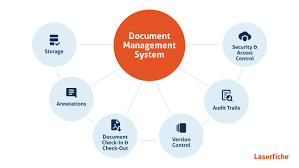
The Importance of Document Control and Management in Business
Document control and management are essential components of any successful business operation. In today’s digital age, businesses generate and handle a vast amount of documents on a daily basis, ranging from contracts and invoices to reports and presentations. Efficient document control and management practices help organizations streamline their processes, enhance productivity, ensure compliance with regulations, and protect sensitive information.
Benefits of Document Control and Management
Implementing robust document control and management systems offer several key benefits:
- Organized Information: Centralized document repositories make it easy to store, retrieve, and share documents across departments.
- Version Control: Ensuring that everyone works with the most current version of a document minimizes errors and confusion.
- Security: Protecting sensitive data through access controls and encryption safeguards against unauthorized access or data breaches.
- Audit Trail: Tracking document changes provides transparency and accountability, crucial for compliance audits.
- Collaboration: Facilitating collaboration by allowing multiple users to work on the same document simultaneously improves teamwork efficiency.
Best Practices for Document Control and Management
To optimize document control and management processes, businesses should consider implementing the following best practices:
- Create a Document Management Policy: Establish clear guidelines on how documents should be created, stored, accessed, updated, and archived within the organization.
- Use Document Management Software: Invest in software solutions that automate document workflows, provide version control features, and ensure secure storage.
- Train Employees: Educate staff on proper document handling procedures to minimize errors, improve efficiency, and maintain data security.
- Regularly Review Processes: Continuously assess document control practices to identify areas for improvement and ensure compliance with industry regulations.
In Conclusion
In conclusion, effective document control and management are vital for businesses looking to optimize their operations, enhance collaboration among teams, mitigate risks associated with data loss or security breaches, and maintain regulatory compliance. By implementing best practices in document control and management, organizations can achieve greater efficiency, productivity, and overall success in today’s competitive business landscape.
“The Role and Responsibilities of a Document Controller: A Detailed Job Description”
“Document Control vs. Information Management: Exploring the Distinctions”
4. “Integrating
- What is document control management?
- What is the job description of document controller?
- What is the difference between document control and information management?
- Is document control part of project management?
What is document control management?
Document control management refers to the systematic process of creating, organizing, storing, accessing, updating, and securing documents within an organization. It involves establishing protocols and procedures to ensure that documents are managed effectively throughout their lifecycle, from creation to disposal. Document control management aims to streamline document workflows, improve collaboration among team members, maintain version control to prevent errors or confusion, enhance data security through access controls and encryption, and facilitate compliance with regulatory requirements. By implementing robust document control management practices, businesses can optimize their document handling processes, reduce risks associated with data loss or unauthorized access, and enhance overall operational efficiency.
What is the job description of document controller?
The job description of a document controller typically involves overseeing the organization, management, and distribution of documents within a company. Document controllers are responsible for maintaining an efficient and organized system for storing, tracking, and retrieving various types of documents, ensuring that they are up-to-date and accessible to authorized personnel. They may also be tasked with implementing document control policies and procedures, conducting quality checks on documents to ensure accuracy and compliance with standards, and collaborating with different departments to streamline document workflows. Attention to detail, strong organizational skills, and proficiency in document management software are essential qualities for a successful document controller in any organization.
What is the difference between document control and information management?
The distinction between document control and information management lies in their scope and focus within the realm of data governance. Document control primarily deals with the management of individual documents, including version control, access permissions, and retention policies. On the other hand, information management encompasses a broader perspective, involving the organization, categorization, retrieval, and utilization of all types of data assets within an organization, not just limited to documents. While document control ensures the proper handling of specific files or records, information management addresses the holistic management of all data sources to support strategic decision-making and operational efficiency across the entire organization.
Is document control part of project management?
Document control is indeed a crucial aspect of project management. Effective document control ensures that project teams have access to the most up-to-date and accurate information, such as project plans, schedules, reports, and communication records. By establishing clear procedures for creating, storing, and managing project documents, project managers can enhance collaboration, reduce errors, improve decision-making processes, and ensure compliance with project requirements. Document control not only contributes to the success of individual projects but also plays a significant role in overall project management practices by promoting organization, accountability, and transparency throughout the project lifecycle.
